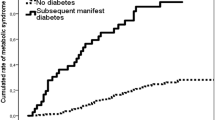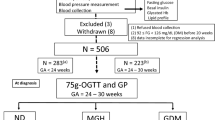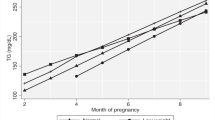Abstract
The goal of this study was to examine associations of measures of maternal glucose metabolism and blood pressure during pregnancy with blood pressure at follow-up in the Hyperglycemia and Adverse Pregnancy Outcome (HAPO) cohort. The HAPO Follow-Up Study included 4747 women who had a 75-g oral glucose tolerance test (OGTT) at ~28 weeks’ gestation. Of these, 4572 women who did not have chronic hypertension during their pregnancy or other excluding factors, had blood pressure evaluation 10–14 years after the birth of their HAPO child. Primary outcomes were systolic blood pressure (SBP), diastolic blood pressure (DBP), and hypertension (SBP ≥ 140 and/or DBP ≥ 90 or treatment for hypertension) at follow-up. Blood pressure during pregnancy was associated with all blood pressure outcomes at follow-up independent of glucose and insulin sensitivity during pregnancy. The sum of glucose z-scores was associated with blood pressure outcomes at follow-up but associations were attenuated in models that included pregnancy blood pressure measures. Associations with SBP were significant in adjusted models, while associations with DBP and hypertension were not. Insulin sensitivity during pregnancy was associated with all blood pressure outcomes at follow-up, and although attenuated after adjustments, remained statistically significant (hypertension OR 0.79, 95%CI 0.68–0.92; SBP beta −0.91, 95% CI −1.34 to −0.49; DBP beta −0.50, 95% CI −0.81 to −0.19). In conclusion, maternal glucose values at the pregnancy OGTT were not independently associated with maternal blood pressure outcomes 10–14 years postpartum; however, insulin sensitivity during pregnancy was associated independently of blood pressure, BMI, and other covariates measured during pregnancy.
This is a preview of subscription content, access via your institution
Access options
Subscribe to this journal
Receive 12 digital issues and online access to articles
$119.00 per year
only $9.92 per issue
Buy this article
- Purchase on Springer Link
- Instant access to full article PDF
Prices may be subject to local taxes which are calculated during checkout
Similar content being viewed by others
References
O’Sullivan JB, Mahan C. Criteria for oral glucose tolerance test in pregnancy. Diabetes. 1964;13:278–85.
Goueslard K, Cottenet J, Mariet A-S, Giroud M, Cottin Y, Petit J-M, et al. Early cardiovascular events in women with a history of gestational diabetes mellitus. Cardiovasc Diabetol. 2016;15:15. https://doi.org/10.1186/s12933-016-0338-0.
Daly B, Toulis KA, Thomas N, Gokhale K, Martin J, Webber J, et al. Increased risk of ischemic heart disease, hypertension, and type 2 diabetes in women with previous gestational diabetes mellitus, a target group in general practice for preventive interventions: a population-based cohort study. PLoS Med. 2018;15:e1002488. https://doi.org/10.1371/journal.pmed.1002488.
Pirkola J, Pouta A, Bloigu A, Miettola S, Hartikainen A-L, Jarvelin M-R, et al. Prepregnancy overweight and gestational diabetes as determinants of subsequent diabetes and hypertension after 20-year follow-up. J Clin Endocrinol Metab. 2010;95:772–8.
Kaul P, Savu A, Nerenberg KA, Donovan LE, Chik CL, Ryan EA, et al. Impact of gestational diabetes mellitus and high maternal weight on the development of diabetes, hypertension and cardiovascular disease: a population-level analysis. Diabet Med. 2015;32:164–73.
Retnakaran R, Shah BR. Role of type 2 diabetes in determining retinal, renal, and cardiovascular outcomes in women with previous gestational diabetes mellitus. Diabetes Care. 2017;40:101–8. https://doi.org/10.2337/dc16-1400.
Lauenborg J, Mathiesen E, Hansen T, Glumer C, Jørgensen T, Borch-Johnsen K, et al. The prevalence of the metabolic syndrome in a Danish population of women with previous gestational diabetes mellitus is three-fold higher than in the general population. J Clin Endocrinol Metab. 2005;90:4004–10.
Tobias DK, Hu FB, Forman JP, Chavarro J, Zhang C. Increased risk of hypertension after gestational diabetes mellitus. Diabetes Care. 2011;34:1582–4. https://doi.org/10.2337/dc11-0268.
Carr D, Utzschneider K, Hull RL, Tong J, Wallace TM, Kodama K, et al. Gestational diabetes mellitus increases the risk of cardiovascular disease in women with a family history of type 2 diabetes. Diabetes Care. 2006;29:2078–83.
Seely EW, Solomon CG. Insulin resistance and its potential role in pregnancy-induced hypertension. J Clin Endocrinol Metab. 2003;88:2393–8.
NICE. Hypertension in pregnancy: diagnosis and management. Guideline ng 133. 2019. www.nice.org.uk/guidance/ng133.
Carpenter MW. Gestational diabetes. Pregnancy, hypertension, and late vascular disease. Diabetes Care. 2007;30:s246–50.
Metzger BE, Lowe LP, Dyer AR, Trimble ER, Chaovarindr U, Coustan DR. et al. Hyperglycemia and adverse pregnancy outcomes. N Engl J Med. 2008;358:1991–2002.
HAPO Study Cooperative Research Group. The hyperglycemia and adverse pregnancy outcome (HAPO) study. Int J Gynecol Obstet. 2002;78:69–77.
Nesbitt GS, Smye M, Sheridan B, Lappin TRJ, Trimble ER. Integration of local and central laboratory functions in a worldwide multicentre study. Experience from the hyperglycemia and adverse pregnancy outcome (HAPO) study. Clin Trials. 2006;3:397–407.
Lowe WL, Jr., Scholtens DM, Lowe LP, Kuang A, Nodzenski M, Talbot O, et al. Association of gestational diabetes with maternal disorders of glucose metabolism and childhood adiposity. JAMA. 2018;320:1005–16.
Brown MA, Magee LA, Kenny LC, Karumanchi SA, McCarthy FP, Saito S, et al. Hypertensive disorders of pregnancy classification, diagnosis, and management recommendations for international practice. Hypertension. 2018;72:24–43.
International Association of Diabetes and Pregnancy Study Groups Consensus Panel. International association of diabetes and pregnancy study groups recommendations on the diagnosis and classification of hyperglycemia in pregnancy. Diabetes Care. 2010;33:676–82.
Radaelli T, Farrell KA, Huston-Presley L, Amini SB, Kirwan JP, McIntyre HD, et al. Estimates of insulin sensitivity using glucose and C-Peptide from the hyperglycemia and adverse pregnancy outcome glucose tolerance test. Diabetes Care. 2010;33:490–4.
HAPO Study Cooperative Research Group. Hyperglycaemia and adverse pregnancy outcome (HAPO) study: associations with maternal body mass index. BJOG. 2010;117:575–84.
Hosmer D Jr, Lemeshow S. Applied logistic regression. 3rd ed. New York: Wiley; 2013;153–225.
Harrell F, Jr. rms: regression modeling strategies: R package version; 2018. p. 51–52.
Team RC. R: a language and environment for statistical computing. Vienna, Austria: R Foundation for Statistical Computing; 2016. https://www.R-project.org.
Plows JF, Stanley JL, Baker PN, Reynolds CM, Vickers MH. The pathophysiology of gestational diabetes mellitus. Int J Mol Sci. 2018;19. https://doi.org/10.3390/ijms19113342.
Liu Y, Kuang A, Talbot O, Bain JR, Muehlbauer MJ, Hayes MG, et al. HAPO study cooperative research group. Metabolomic and genetic associations with insulin resistance in pregnancy. Diabetologia. 2020;63:1783–95.
Adams SH, Hoppel CL, Lok KH, Zhao L, Wong SW, Minkler PE, et al. Plasma acylcarnitine profiles suggest incomplete long-chain fatty acid beta-oxidation and altered tricarboxylic acid cycle activity in type 2 diabetic African–American women. J Nutr. 2009;139:1073–81. https://doi.org/10.3945/jn.108.103754.
Nowak C, Hetty S, Salihovic S, Castillejo-Lopez C, Ganna A, Cook NL, et al. Glucose challenge metabolomics implicates medium-chain acylcarnitines in insulin resistance. Sci Rep. 2018;8:8691. https://doi.org/10.1038/s41598-018-26701-0.
National Collaborating Centre for Women’s and Children’s Health, Diabetes in pregnancy. Management of diabetes and its complications from preconception to the postnatal period. NICE Guideline. 2015;3. www.nice.org.uk/guidance/ng3.
American College of Obstetricians and gynecologists practice bulletin No. 190: gestational diabetes mellitus. Obstet Gynecol. 2018;131:e49–64.
Acknowledgements
The HAPO FUS investigators are grateful for the women and children who participated in HAPO and HAPO FUS.
Funding
The HAPO Follow-Up Study is funded by grant 1U01DK094830 from the National Institute of Diabetes, Digestive, and Kidney Diseases and the Eunice Kennedy Shriver National Institute of Child Health and Human Development. Study data were collected and managed using REDCap electronic data capture tools hosted at Northwestern University Feinberg School of Medicine (FSM). REDCap is supported at FSM by the Northwestern University Clinical and Translational Science (NUCATS) Institute. The research reported in this publication was supported, in part, by the National Institutes of Health’s National Center for Advancing Translational Sciences, grant UL1TR001422. The content is solely the responsibility of the authors and does not necessarily represent the official views of the National Institutes of Health.
Author information
Authors and Affiliations
Contributions
BEM, LPL, WLL, DMS, and ARD conceived and designed the study, assisted with data collection, interpreted the data, and participated in writing the manuscript. MM and WLL researched the literature. AK analyzed the data. MM acquired data, drafted the original manuscript, and participated in its revisions. JML, CD, and DS acquired data and participated in writing the manuscript. All authors approved the final manuscript as submitted.
Corresponding author
Ethics declarations
Conflict of interest
The authors declare that they have no conflict of interest.
Additional information
Publisher’s note Springer Nature remains neutral with regard to jurisdictional claims in published maps and institutional affiliations.
Rights and permissions
About this article
Cite this article
Maresh, M., Lawrence, J.M., Scholtens, D.M. et al. Association of glucose metabolism and blood pressure during pregnancy with subsequent maternal blood pressure. J Hum Hypertens 36, 61–68 (2022). https://doi.org/10.1038/s41371-020-00468-2
Received:
Revised:
Accepted:
Published:
Issue Date:
DOI: https://doi.org/10.1038/s41371-020-00468-2



